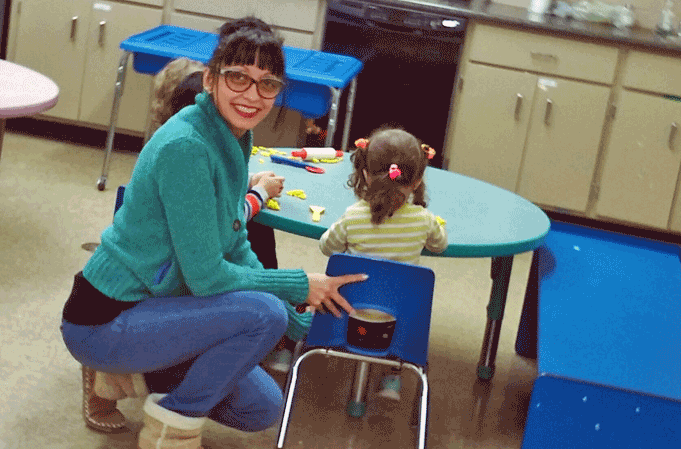
SPO Highlight: Thames Valley District School Board–Village Green
 Roxana Radu’s journey to CNC was unusual. While following her plan to teach ESL to adults, she had an experience that changed her life and goals.
Roxana Radu’s journey to CNC was unusual. While following her plan to teach ESL to adults, she had an experience that changed her life and goals.
Roxana wanted to be an ESL instructor. Leaving Romania and coming to Canada, she pursued and fulfilled this goal. She certified as an ESL instructor and became a supply teacher in the Thames Valley District School Board. One day, the Program Coordinator, Sheila Carson, said they were short staffed and asked her to go and work with the young children. That day changed everything. Roxana felt she was finally home. It didn’t feel like work. By the end of the day she was unsure if she was in the right career anymore. Working with children was so rewarding and it felt like the place where she belonged.
Roxana continued teaching ESL. But she let Sheila know that she would supply for the CNC program whenever they needed help. Pretty soon she was working in the childcare and learning on the job. Yet, Roxana felt that if she wanted to be successful in the children’s program, it meant she would have to go back to school. Fortunately, she found out that there was a program called the Training Opportunities Program (TOP) to help CNC staff get their Early Childhood Education (ECE) diploma. Funded by IRCC, the TOP program would reimburse CNC staff for the successful completion of ECE courses. Roxana decided to follow that path to fulfill her dream. On the day that she registered, she also found out she was pregnant. She started her courses —and even finished an assignment in the delivery room! It took her two years, but she completed the courses and was certified as an Early Childhood Educator—all while parenting and working.
We had a chance to talk to Roxana about her unconventional journey to CNC.
You have an interesting perspective. You have worked both with immigrant parents and now their children. How does having worked with newcomer parents inform how you work with them to support their children?
Because I am an immigrant and the fact that I got to know adult newcomers first through LINC, I have a better feel for their world. It gives me a better understanding of parent beliefs and values—and just how important their kids are to them. Some come here and have nothing else besides their child. In certain cultures, the child is their world and we have to take this into consideration.
When you become a parent, as I did at the time, you understand this love and can value a parent’s opinion more. Every parent wants the best for their child, but some don’t have the information or resources they need. For example, you might not agree with a parent’s routine for their child. But war zones are not conducive to routines. You can give advice about what is an appropriate time to go sleep, but it is a matter of delivery and how you put into perspective for them.
Cultural knowledge and getting to know families is important when planning programming. You register families without knowing much about their stories and what they went through, what they value, what their culture means to them. I can understand this, so I can better put it into practice when it comes to working with their kids.
Knowing what you know now, what advice would your former LINC instructor self give to better support parents in the program?
I would offer and integrate more information and resources about schools in the classes. Most people in ESL classes have kids in the school system. They have so many questions about how the school system works. I would encourage parents to bring in their questions, and even letters from school. Answers could be discussed in the listening and speaking part of the class. After all, they only meet with caseworkers once per month—but they see their ESL teachers and CNC program workers every day.
And, what advice would you give to CNC staff to better understand the immigrant parent perspective?
Get knowledge of a family’s background. It is good to inform yourself about the situation of where they come from and why they have come. For example, did they come from a war zone? As caregivers, we need to be sensitive to that.
For some caregivers to come from regular childcare, they will notice the kids in CNC may react differently. It is the experiences the kids have been through that make them react this way. Immigrants, especially refugees, may have a different response to different stimulants—and to different people. For our children, strange faces and loud noises—even flushing of a toilet—scare them. Another example? Everything becomes a gun. For some children, their idea of pretend play is war, because that is what they know. We need to work with them to change behaviours and help distance themselves from these bad experiences, so they can move on with their lives.
When you end up working with a child—you need to give space and lots of time observing. Trying to impose a regular routine right away can be traumatic. Give days and weeks to let them get comfortable with the environment and with you. And, if you give them a safe environment, then everything will fall into place.






